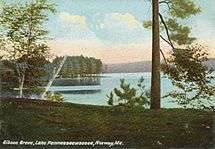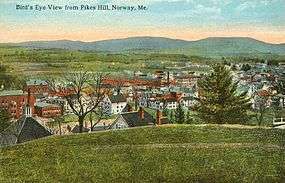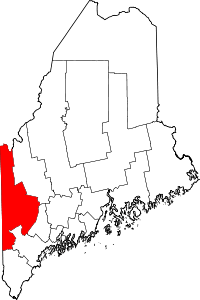Norway, Maine
| Norway, Maine | |
|---|---|
| town | |
|
Bird's-eye view from Pikes Hill c. 1912 | |
 Norway, Maine Location within the state of Maine | |
| Coordinates: 44°12′42″N 70°32′18″W / 44.21167°N 70.53833°WCoordinates: 44°12′42″N 70°32′18″W / 44.21167°N 70.53833°W | |
| Country | United States |
| State | Maine |
| County | Oxford |
| Area[1] | |
| • Total | 47.33 sq mi (122.58 km2) |
| • Land | 45.04 sq mi (116.65 km2) |
| • Water | 2.29 sq mi (5.93 km2) |
| Elevation | 387 ft (118 m) |
| Population (2010)[2] | |
| • Total | 5,014 |
| • Estimate (2012[3]) | 4,979 |
| • Density | 111.3/sq mi (43.0/km2) |
| Time zone | Eastern (EST) (UTC-5) |
| • Summer (DST) | EDT (UTC-4) |
| Area code(s) | 207 |
Norway is a town in Oxford County, Maine, United States. The population was 5,014 at the 2010 census. It is home to Lake Pennesseewassee, a recreation area.
History
The town was first called Rustfield after Henry Rust of Salem, Massachusetts, a large landowner. It was cleared and settled after 1786 by Joseph Stevens, followed by George Leslie, Amos Hobbs, Jeremiah Hobbs, Jonas Stevens and Nathaniel Stevens, together with their families from Gray. Many who moved here had been soldiers in the Revolutionary War, including Phineas Whitney, who fought at the Battle of Bunker Hill. A sawmill and gristmill were established in 1789, and in 1796, the first road was built. Rustfield Plantation was incorporated on March 9, 1797, as Norway.[4] The town had petitioned the Massachusetts General Court to be named Norage, which is Native American for falls. Why it was changed is unknown—fire destroyed the town records in 1843.[5] During the Civil War, Norway and other municipalities in Oxford County provided a militia company to the 1st Maine Volunteer Infantry Regiment under the command of George Lafayette Beal, who would later rise to the rank of major general and serve as State Treasurer from 1888 to 1894.
The town had fertile soil for cultivation. The Pennesseewassee Stream, which drains Lake Pennesseewassee into the Little Androscoggin River, provided water power for industry. At the falls were established two grain mills, a cloth and carding mill, furniture factory, box factory and a shovel handle factory. There was a tannery, with other businesses making harness and trunks. A shoe manufactory was established in 1872. The busy stage route from Paris, the county seat, to Fryeburg passed through Norway. By 1878, there were 32 stores in the town, which for a number of years had the fastest growing population of any similar town in the state.[6] On December 30, 1879, the Norway Branch Railroad opened, running from Norway village on a line 1.45 miles (2.3 kilometers) long to connect with the Atlantic and St. Lawrence Railroad (later Grand Trunk Railroad) at South Paris.[7] But the Great Norway Fire of May 9, 1894, would destroy a substantial portion of the business district. Started in the C. B. Cummings & Sons mill, it was spread by a strong wind down Main Street. The opera house, Congregational Church, tannery, and 80 homes and other buildings were lost. Much of Norway was rebuilt the same year, with several structures in brick.[8]
Norway was once called the "Snowshoe Capital of the World" because of the many snowshoes manufactured here. In 1906, Walter Tubbs established the Tubbs Snowshoe Company to produce ash snowshoes, skis, sleds and furniture. The firm made 70% of the snowshoes ordered by the U.S. government during World War II, and also supplied the polar expeditions of Byrd and Peary.[9] In the 1940s, the Tubbs Company moved to Vermont, and in 2004, it was bought by K2 Sports. The snowshoes are now made at a factory in Guangzhou, China.[10]
In 1997, the New Balance Shoe Company built a new manufacturing facility at Norway. The C. B. Cummings & Son Company, founded in 1860 to make dowels and other wood products, closed and auctioned its downtown plant in 2001 because of competition from China. In addition, the business had lost customers when furniture factories in the Carolinas shut down.[11]
 Opera House in 1906
Opera House in 1906 Main Street in 1908
Main Street in 1908 Downtown in 1907
Downtown in 1907 Street scene in 1906
Street scene in 1906
Municipal
Norway is in School Administrative District (SAD) 17. Children attend Rowe Elementary School from pre-kindergarten to grade 6. Older students attend Oxford Hills middle school and high school.[12]
Norway has a water district and a waste water treatment facility. The town is administered by a board of selectmen. The town has a planning board.[13]
Geography
According to the United States Census Bureau, the town has a total area of 47.33 square miles (122.58 km2), of which 45.04 square miles (116.65 km2) is land and 2.29 square miles (5.93 km2) is water.[1] Norway is drained by the Pennesseewassee Stream and Little Androscoggin River.
The town is crossed by state routes 26, 117 and 118. It borders the towns of Greenwood and West Paris to the north; Paris to the east; Oxford to the southeast; Otisfield to the south; Harrison to the southwest; Waterford to the west; and Albany to the northwest.
Climate
This climatic region is typified by large seasonal temperature differences, with warm to hot (and often humid) summers and cold (sometimes severely cold) winters. According to the Köppen Climate Classification system, Norway has a humid continental climate, abbreviated "Dfb" on climate maps.[14]
Demographics
| Historical population | |||
|---|---|---|---|
| Census | Pop. | %± | |
| 1800 | 609 | — | |
| 1810 | 1,010 | 65.8% | |
| 1820 | 1,294 | 28.1% | |
| 1830 | 1,713 | 32.4% | |
| 1840 | 1,786 | 4.3% | |
| 1850 | 1,963 | 9.9% | |
| 1860 | 1,982 | 1.0% | |
| 1870 | 1,954 | −1.4% | |
| 1880 | 2,519 | 28.9% | |
| 1890 | 2,665 | 5.8% | |
| 1900 | 2,902 | 8.9% | |
| 1910 | 3,002 | 3.4% | |
| 1920 | 2,969 | −1.1% | |
| 1930 | 3,145 | 5.9% | |
| 1940 | 3,649 | 16.0% | |
| 1950 | 3,811 | 4.4% | |
| 1960 | 3,733 | −2.0% | |
| 1970 | 3,595 | −3.7% | |
| 1980 | 4,042 | 12.4% | |
| 1990 | 4,754 | 17.6% | |
| 2000 | 4,611 | −3.0% | |
| 2010 | 5,014 | 8.7% | |
| Est. 2014 | 4,942 | [15] | −1.4% |
The town of Norway was primarily settled by people of European origin, and has a small Finnish-American community.
2010 census
As of the census[2] of 2010, there were 5,014 people, 2,163 households, and 1,357 families residing in the town. The population density was 111.3 inhabitants per square mile (43.0/km2). There were 2,804 housing units at an average density of 62.3 per square mile (24.1/km2). The racial makeup of the town was 96.1% White; 0.4% African American; 0.6% Native American; 0.6% Asian; 0.1% Pacific Islander; 0.1% from other races; and 2.3% from two or more races. Hispanic or Latino of any race were 1.0% of the population.
There were 2,163 households of which 27.8% had children under the age of 18 living with them; 44.0% were married couples living together; 13.3% had a female householder with no husband present; 5.5% had a male householder with no wife present; and 37.3% were non-families. 28.7% of all households were made up of individuals and 13.5% had someone living alone who was 65 years of age or older. The average household size was 2.28 and the average family size was 2.75.
The median age in the town was 44.4 years. 21.4% of residents were under the age of 18; 6.9% were between the ages of 18 and 24; 22.5% were from 25 to 44; 29.3% were from 45 to 64; and 20.1% were 65 years of age or older. The gender makeup of the town was 48.5% male and 51.5% female.
2000 census
Per the census[17] of 2000, there were 4,611 people, 1,972 households, and 1,256 families residing in the town.
The median income for a household in the town was $28,497, and the median income for a family was $34,464. Males had a median income of $26,612 versus $20,417 for females. The per capita income for the town was $17,020. About 9.8% of families and 12.7% of the population were below the poverty line, including 16.1% of those under age 18 and 10.1% of those age 65 or over.
Stereographic cards of Norway
 Horse pulling cart
Horse pulling cart Streets of Norway
Streets of Norway Street view
Street view Norway dwellings
Norway dwellings Dwellings and streets
Dwellings and streets
Sites of interest
Notable people

- George Lafayette Beal, Civil War era general, state treasurer
- Mellie Dunham, fiddler, snowshoe maker
- Marshall Kirk, genealogist, writer
- Henry Rust Mighels, journalist, politician
- Talbot Mundy, author
- George Lorenzo Noyes, naturalist, writer, artist
- Donald B. Partridge, US congressman
- Don Carlos Seitz, author, journalist
- C. A. Stephens, writer
References
- 1 2 "US Gazetteer files 2010". United States Census Bureau. Retrieved 2012-12-16.
- 1 2 "American FactFinder". United States Census Bureau. Retrieved 2012-12-16.
- ↑ "Population Estimates". United States Census Bureau. Retrieved 2013-07-06.
- ↑ Coolidge, Austin J.; John B. Mansfield (1859). A History and Description of New England. Boston, Massachusetts. pp. 239–240.
- ↑ Origins of the Name: Norway, Maine
- ↑ Varney, George J. (1886), Gazetteer of the state of Maine. Norway, Boston: Russell
- ↑ "Historical Sketch of Norway, Maine", Boston, Massachusetts 1889
- ↑ Oxford County Genealogy Notebook – Norway, Maine
- ↑ Maine League of Historical Societies and Museums (1970). Doris A. Isaacson, ed. Maine: A Guide 'Down East'. Rockland, Me: Courier-Gazette, Inc. p. 399.
- ↑ Business People, Vermont – Tubbs Snowshoe Company
- ↑ Blethen Maine Newspapers – Foreign competition kills dowel mill 2002
- ↑ "About our Schools". SAD17.k12.me.us. Retrieved August 25, 2014.
- ↑ "Norway, Maine". Retrieved August 25, 2014.
- ↑ Climate Summary for Norway, Maine
- ↑ "Annual Estimates of the Resident Population for Incorporated Places: April 1, 2010 to July 1, 2014". Retrieved June 4, 2015.
- ↑ "Census of Population and Housing". Census.gov. Retrieved June 4, 2015.
- ↑ "American FactFinder". United States Census Bureau. Retrieved 2008-01-31.
External links
- Town of Norway, Maine
- Norway Memorial Library
- University College at Norway/South Paris
- Advertiser Democrat, regional weekly newspaper
- NorwayLake.com, info about Norway Lake
- Lakes Association of Norway
- Maine.gov – Norway, Maine
- Maine Genealogy: Norway, Oxford County, Maine

